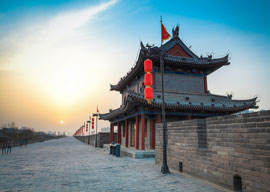
August 08, 2013

Source: Shutterstock
Then he switches to the replacement post-Soviet meta-narrative popularized by Francis Fukuyama, with its different end of history: worldwide liberal democracy. “But this time the Chinese didn”t buy it. Fool me once….” Both grand historical schemas are, says Li, equally illusory.
He goes on to tell us how adaptable the Chinese Communist Party (CCP) has been, at least since Mao’s departure. It is now, he claims, a very pure meritocracy, carefully watching the ascent of capable managers through ever-higher levels of command.
Of the 25 Politburo members before the 18th Party Congress [last November], 19 had run provinces larger than most countries in the world….A person with Barack Obama’s pre-presidential professional experience would not even be the manager of a small county in China’s system.
Some of Li’s essay/talk overlaps with Richard McGregor’s book The Party, which I wrote about on this site a couple of years ago.
The counter-article in that same issue of Foreign Affairs is “Democratize or Die” by political economist Yasheng Huang. This writer isn”t as much fun to read as Eric X. Li, and I have no corresponding video to link to, but Huang makes a good case for the defense.
He concedes that a person with Barack Obama’s near-blank résumé would not have risen far in Chinese politics, but he points out that Party boss Bo Xilai, who ran a corrupt little empire in southwest China until his chief of police tried to defect to the USA, looked set fair to ride that meritocratic escalator all the way to the Politburo. Bo goes on trial for corruption and abuse of power this week; his wife has already confessed to murder.
Huang is right: The notion of a streamlined, efficient dictatorship in which the mess and clamor of democracy is stilled and the trains run on time has been with us all through the modern age and has seduced people smarter than Eric X. Li (and with less money invested in the system).
Li has a point, too, though. The CCP has proved more adaptable than any of us thought thirty”or twenty, or ten”years ago. Absent some horrid natural catastrophe or foolish military adventure, they could go on for decades, although probably spawning ever-increasing numbers of local gangster-despots like Bo. And if the present-day Chinese empire is to be held together, with its unhappy subject populations in the vast territories of Tibet and Eastern Turkestan, a dictatorship is necessary.
The drift of our own political culture seems to be confirming the Founders“ intuition that representative government can only work in a population possessed of some minimum level of virtue“thrift, restraint, industriousness, stoicism in the face of misfortune, willingness to defer gratification, and concern for the common good.
Is there still that much virtue in the United States? Or has our virtue leaked away through our gadgets, our infinity of pleasures, and our culture of preening “identity”? I suppose we shall find out.